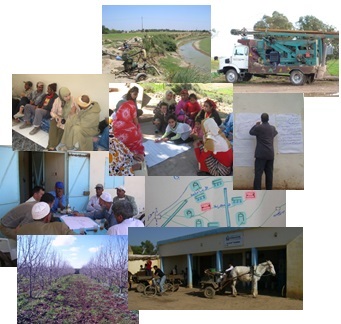Sami Salhi
DOI : https://doi.org/10.60569/hsoua-a2
Hors série ouvrières agricoles, juillet 2024
Résumé
La main d’œuvre agricole féminine représente une composante cruciale et omniprésente au sein de l’économie agricole marocaine. Or, nul ne peut nier les conditions de travail truffées de multiples formes de non-conformité au droit du travail. Face à la situation de précarité et de vulnérabilité, et loin de les représenter, seulement, comme un groupe de victimes de processus politiques, économiques et sociaux, cet article examine comment les femmes, en tant que sujets, ont la capacité d’agir contre les relations de pouvoir asymétriques qui marquent ce milieu du travail agricole. S’appuyant sur un travail de terrain ethnographique effectué sur le site de Berkane – Région de l’Oriental- et celui de Chtouka Ait Baha – Région de Souss Massa, l’article analyse les actes de résistance subtils des travailleuses agricoles. En adoptant l’approche de J.C. Scott des résistances quotidiennes, notre analyse a montré que, sous les aspects de l’exploitation et la subordination, les femmes résistent par des pratiques (nouer des relations positives, sabotages, commérages, fausse conformité et fausse déférence, etc.), durant leurs interactions quotidiennes, ayant comme objectifs l’atténuation des conditions de travail précaires et flexibles et la réduction du contrôle et de l’autorité de la hiérarchie du milieu de travail. Ainsi, le recours à la résistance quotidienne parmi les ouvrières ne peut que confirmer que les femmes sont loin d’être passives, même si elles sont subordonnées économiquement et politiquement.
Mots clés : résistances quotidiennes, travailleuses agricoles, travail journalier, agro-export, Oriental, Souss Massa.
في ظلال المعيش اليومي: المقاومة الخفيّة للعاملات الزراعيات في المغرب
ملخص
تلعب اليد العاملة الزراعية النسائية دوراً محورياً وحيوياً في الاقتصاد الزراعي في المغرب غير أنه لا يمكن إنكار أن ظروف عملها غير ممتثلة لشروط قانون الشغل. في سياق تطبعه الهشاشة والضعف، وبعيدًا عن تصورهن كمجموعة ضحايا المنظومة السياسية والاقتصادية والاجتماعية، يدرس هذا المقال قدرة النساء، كذوات، على الفعل إزاء علاقات القوة غير المتكافئة التي تميز بيئة العمل الزراعي. استنادا على نتائج عمل ميداني إثنوغرافي أُنجز في منطقة بركان – الجهة الشرقية – ومنطقة شتوكة آيت باها – جهة سوس ماسة، يهدف هذا المقال بالأساس إلى تحليل أفعال المقاومة الخفية التي تقوم بها العاملات الزراعيات اعتمادا على مفهوم المقاومة في النسق اليومي لجيمس سكوت J.C. Scott.. تُظهر الدراسة أنه في ظل أوجه الاستغلال والتبعية، استطاعت النساء بلورة أشكال من المقاومة أثناء تعاملاتهن اليومية على شكل تخريب، وبناء علاقات إيجابية، ونميمة وانصياع زائف ورضوخ صوري، وذلك بهدف التخفيف من ظروف العمل الهشة والمرنة، وبغرض الحد من سيطرة وسلطة التسلسل الهرمي في مكان العمل. وعليه، فإن انتهاج العاملات الزراعيات للمقاومة اليومية وتحويلها إلى ممارسة حياتيّة يؤكد أنهن لسن سلبيات، مستضعفات ومجردات من أي قدرة على الفعل، حتى لو كنّ تابعات اقتصاديًا وسياسيًا.
الكلمات المفتاحية: المقاومة في النسق اليومي، عاملات زراعيات، الزراعة التصديرية، جهة الشرق، جهة سوس ماسة، المغرب.
In the shadow of everyday life: The hidden resistance of women farm workers in Morocco
Abstract
The female agricultural workforce is a crucial and omnipresent component of the Moroccan agricultural economy. Yet no one can deny that their working conditions are riddled with many forms of non-compliance with labour law. Faced with a situation of precariousness and vulnerability, and far from representing them simply as a group of victims of political, economic and social processes, this article examines how women, as subjects, have the capacity to act against the asymmetrical power relations that mark this agricultural work environment. Based on ethnographic fieldwork carried out at the Berkane site in the Oriental region and the Chtouka Ait Baha site in the Souss Massa region, the article analyses the subtle acts of resistance by women farm workers. Adopting J.C. Scott’s approach to daily resistance, our analysis showed that, under apparent processes of exploitation and subordination, women resist through practices (building positive relationships, sabotage, gossip, false conformity and deference, etc.), during their daily interactions, with the objectives of mitigating precarious and flexible working conditions and reducing the control and authority of the workplace hierarchy. Thus, the use of daily resistance among women workers confirm that these women are far from passive, even if they are economically and politically subordinate.
Key words : Everyday resistance, women farmworkers, daily work, agro-export, Oriental, Souss Massa

